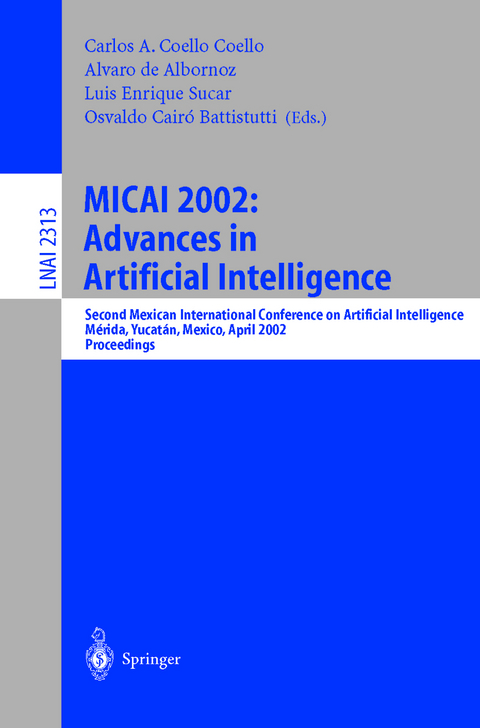
MICAI 2002: Advances in Artificial Intelligence
Springer Berlin (Verlag)
978-3-540-43475-7 (ISBN)
Robotics and Computer Vision.- Motion Planning for Car-Like Robots Using Lazy Probabilistic Roadmap Method.- A Vision System for Environment Representation: From Landscapes to Landmarks.- Adapting the Messy Genetic Algorithm for Path Planning in Redundant and Non-redundant Manipulators.- Navigation Advice from pq-Histograms.- Path Planning Using a Single-Query Bi-directional Lazy Collision Checking Planner.- An Exploration Approach for Indoor Mobile Robots Reducing Odometric Errors.- Feature Matching Using Accumulation Spaces.- On Selecting an Appropriate Colour Space for Skin Detection.- Heuristic Search and Optimization.- A Methodology for the Statistical Characterization of Genetic Algorithms.- MPSA: A Methodology to Parallelize Simulated Annealing and Its Application to the Traveling Salesman Problem.- A Cultural Algorithm for Constrained Optimization.- Penalty Function Methods for Constrained Optimization with Genetic Algorithms: A Statistical Analysis.- Automatic Generation of Control Parameters for the Threshold Accepting Algorithm.- Genetic Algorithms and Case-Based Reasoning as a Discovery and Learning Machine in the Optimization of Combinational Logic Circuits.- Speech Recognition and Natural Language.- Time-Domain Segmentation and Labelling of Speech with Fuzzy-Logic Post-Correction Rules.- IL MT System.Evaluation for Spanish-English Pronominal Anaphora Generation.- Out-of-Vocabulary Word Modeling and Rejection for Spanish Keyword Spotting Systems.- The DIME Project.- Detecting Deviations in Text Collections: An Approach Using Conceptual Graphs.- Using Long Queries in a Passage Retrieval System.- Logic.- Object-Oriented Constraint Programming with J.CP.- A Hybrid Treatment of Evolutionary Sets.- Games and Logics of Knowledge for Multi-agent Systems.- Modelling Learners of a Control Task with Inductive Logic Programming: A Case Study.- Simple Epistemic Logic for Relational Database.- Solving Optimal Location of Traffic Counting Points at Urban Intersections in CLP(FD).- Flexible Agent Programming in Linear Logic.- Neural Networks.- Sample Complexity for Function Learning Tasks through Linear Neural Networks.- Extracting Knowledge from Artificial Neural Networks: An Empirical Comparison of Trepan and Symbolic Learning Algorithms.- Improving Pattern Recognition Using Several Feature Vectors.- Learning Optimization in a MLP Neural Network Applied to OCR.- Machine Learning.- Applications of a Collaborative Learning Ontology.- Automated Case Generation from Databases Using Similarity-Based Rough Approximation.- On the Stability of Example-Driven Learning Systems: A Case Study in Multirelational Learning.- Sharpe Ratio-Oriented Active Trading: A Learning Approach.- Multiagent Systems.- A Framework for Social Agents' Interaction Based on Communicative Action Theory and Dynamic Deontic Logic.- Autonomous Agents for Ubiquitous Collaborative Environments.- A Framework for Agent Based Network Management Systems.- A Multi-agent Cooperative Intelligent Tutoring System: The Case of Musical Harmony Domain.- Reacting to Unexpected Events and Communicating in Spite of Mixed Ontologies.- Logic of Interaction for Multiagent Systems.- Towards a Model for an Immune System.- Uncertainty Management.- A New Measure for the Accuracy of a Bayesian Network.- FINDS: A Training Package to Assess Forensic Fibre Evidence.- Predictive Control Based on an Auto-regressive Neuro-fuzzy Model Applied to the Steam Generator Startup Process at a Fossil Power Plant.- Modeling Dynamical Causal Interactions with Fuzzy Temporal Networks for Process OperationSupport Systems.- AI Tools and Applications.- Resection Simulation with Local Tissue Deformations for Computer Assisted Surgery of the Prostate.- Biometrics and Data Mining: Comparison of Data Mining-Based Keystroke Dynamics Methods for Identity Verification.- Qualitative Systems Identication for Linear Time Invariant Dynamic Systems.- Monitoring the Execution of an Intelligent Planning System.- A Structural Model of ECA Rules in Active Database.- Use of a Rule-Based System for Process Control: Flow Instabilities in Axial Compressors Case Study.- A Distributed Event Service for Adaptive Group Awareness.- Mining Road Accidents.- An Inference Engine for Web Adaptive Cooperative Work.- Faults Diagnosis in Industrial Processes with a Hybrid Diagnostic System.
| Erscheint lt. Verlag | 27.3.2002 |
|---|---|
| Reihe/Serie | Lecture Notes in Artificial Intelligence | Lecture Notes in Computer Science |
| Zusatzinfo | XIV, 554 p. |
| Verlagsort | Berlin |
| Sprache | englisch |
| Maße | 155 x 235 mm |
| Gewicht | 789 g |
| Themenwelt | Informatik ► Grafik / Design ► Digitale Bildverarbeitung |
| Informatik ► Theorie / Studium ► Künstliche Intelligenz / Robotik | |
| Schlagworte | Algorithmic Learning • Artificial Intelligence • Cognition • Computational Intelligence • computer vision • Decision Making • Formal Reasoning • Hardcover, Softcover / Informatik, EDV/Informatik • HC/Informatik, EDV/Informatik • Heuristics • Intelligence • Intelligent Information Processing • learning • Logic • logics • machine learning • multi-agent system • Natural Language Processing • Neural Computation • neural network • Optimization • Problem Solving • robot • Robotics • Speech Recognition • Uncertainty |
| ISBN-10 | 3-540-43475-5 / 3540434755 |
| ISBN-13 | 978-3-540-43475-7 / 9783540434757 |
| Zustand | Neuware |
| Informationen gemäß Produktsicherheitsverordnung (GPSR) | |
| Haben Sie eine Frage zum Produkt? |
aus dem Bereich


